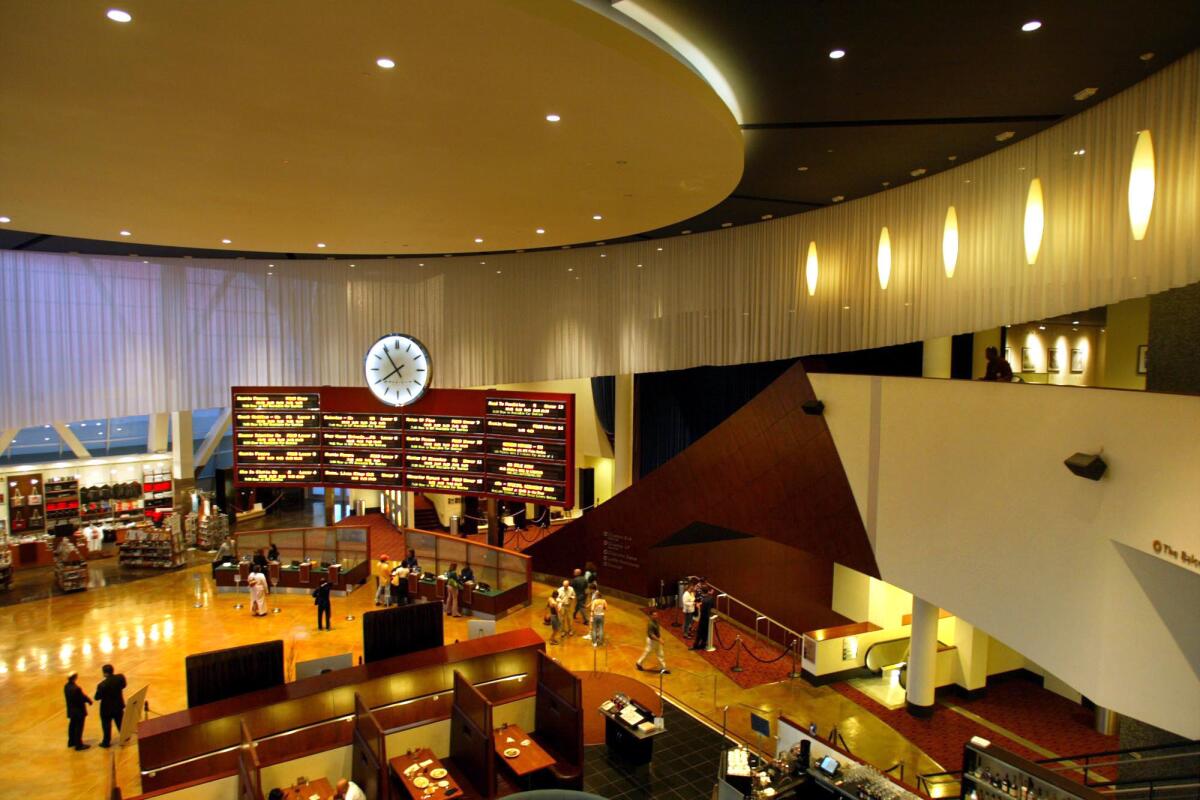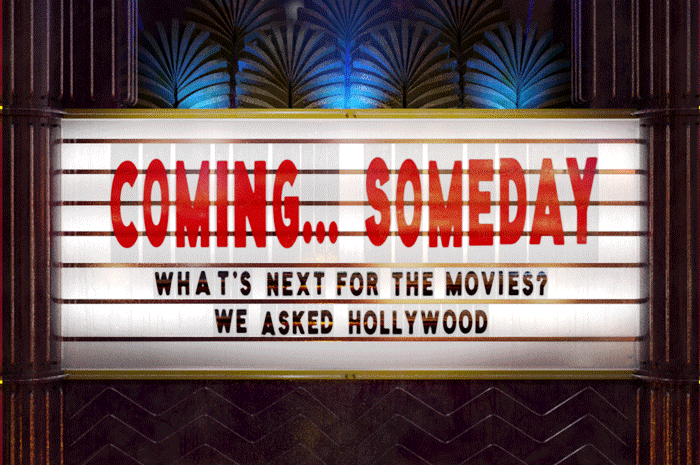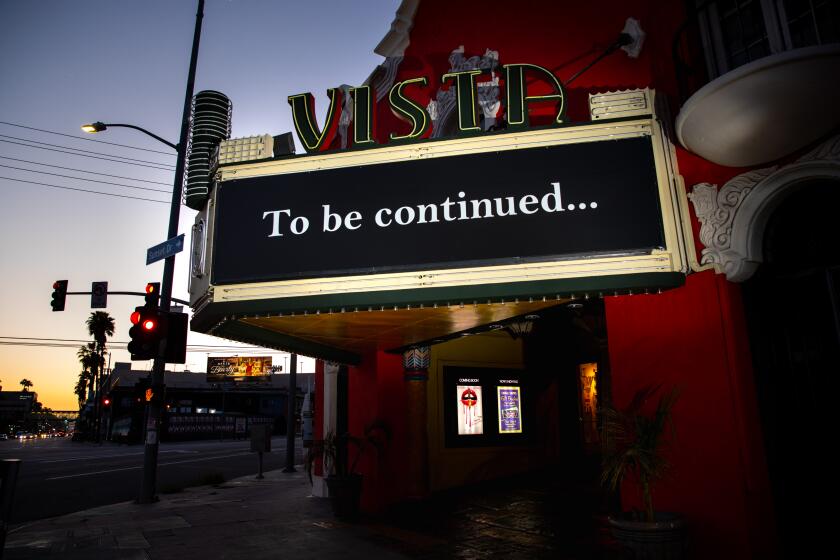How will movie theaters make customers feel safe after coronavirus?

The nationâs beleaguered movie theaters, shuttered in March by the novel coronavirus, are understandably eager to reopen once the pandemic subsides. After weeks of almost no revenue, thereâs rising hope that bricks-and-mortar cinemas, a cornerstone of the film business, will begin returning by mid-June.
But the reality is much more complicated. No one knows when public health guidelines will allow multiplexes to reopen. And when they do, itâs unclear when people will feel safe going into a darkened auditorium with a crowd of strangers.
Rich Millard, a 37-year-old father of two in Rancho Palos Verdes, fondly remembers taking his 7-year-old son to see âSonic the Hedgehogâ earlier this year. The video engineer, whose work also was shut down due to the coronavirus, hopes theaters can return soon but doesnât see himself rushing back to the cinema.
âIâd be willing to go out just with me and my wife maybe a month after they reopen,â he said. âWeâll wait even longer before the kids go back.â
Lingering concerns among patrons are a major reason why the return of the movie business will be a long slog. Filmgoing in the U.S. â which generates about $15 billion in ticket and concession sales a year and employs 150,000 people â probably wonât fully recover for 18 months to two years, analysts said. Before a vaccine and reliable immunity testing are widely available, a return to prior strength seems unlikely.
Meanwhile, the closures are expected to have lasting effects on the more than century-old movie theater business. Some small, struggling chains probably will go out of business. Large operators may be forced to unload locations. AMC, the countryâs largest circuit, has raised $500 million in private debt to stay afloat, adding to its substantial leverage.
With California debating reopening during the coronavirus, whatâs next for the movies? We asked Hollywood
âThere will be a culling of the herd, somewhat,â said Eric Wold, an analyst at B. Riley FBR who follows the major theater owners.
Officials in some states have already started reopening their economies. Georgiaâs Republican Gov. Brian Kemp said theaters could resume business on April 27, though AMC, Regal and Cinemark chains stayed closed. Texas Gov. Greg Abbott declared movie theaters could open with 25% capacity on May 1. But in California, Gov. Gavin Newsom said Tuesday it would be âmonths, not weeksâ before theaters reopen.
Many people will be hungry for entertainment options after weeks of being sequestered at home. But the major theater chains have resisted the urge to reopen, even in states that are easing restrictions, because of the potential resurgence of the virus and liabilities if moviegoers get sick.
Most cinemas couldnât open right away even if they wanted to. They will not only have to rehire workers but also train them in strict social distancing and sanitary standards. Auditoriums will probably have to be thoroughly cleaned between screenings, which could cut down the number of showtimes.
Movie theaters expect to be shut down for months. Some may not survive.
Multiplexes will need to block out seats to create enough space between patrons, making every other row available or eliminating chairs in a checkerboard pattern on their advance sales webpages. Some have considered temperature checks for moviegoers.
For most operators, itâs far too early to make firm decisions about how to proceed.
âIt will be a methodical, gradual return,â said Ted Mundorff, president of Los Angeles-based ArcLight Cinemas. âFolks will come back, we just have to see how quickly.â
Adding to the uncertainty is a lack of new movies available to theaters, as studios continue to push back their major releases.
Even if theaters in the South and Midwest open early, studios wonât release their big films until the largest domestic markets, L.A. and New York, are back in business. For now, the next potential blockbuster on the schedule is Warner Bros.â Christopher Nolan film âTenet,â set for July 17, followed by Walt Disney Studiosâ âMulanâ (July 24).
âTheaters opening now, I think, is a bit silly,â said Eric Handler, an analyst with MKM Partners. âThereâs no content to show, and people are going to be nervous about congregating.â
There will be a culling of the herd, somewhat.
— Eric Wold, an analyst at B. Riley FBR
Indeed, the National Assn. of Theatre Owners, the Washington-based lobbying arm of the exhibition business, on April 23 said, âMany theaters will not be able to feasibly open,â despite the easing of restrictions in some states. Leawood, Kan.-based AMC said it would only be wise to open âdirectly in advance of the release of major new movie titles.â
Exhibitors and studios are exploring ways to get nervous customers back in the habit of going to theaters again, such as special repertory screening programs and marketing initiatives. Distributors, for example, have courted actors and filmmakers to participate in âwelcome backâ PSAs for theater openings. Some theaters may offer weekday discounts for people more comfortable going to the movies on less busy days.
âThereâs a lot of think-tanking going on,â said Chris Aronson, president of domestic distribution at Paramount Pictures. âAs long as the exhibitors convey the fact that thereâs a clean and safe environment, people will want to come back. The thing that is of paramount importance is to get the business back up and running.â
During the first couple of weeks, cinemas will focus on playing feel-good movies, like animated films, family classics and lighter action flicks (think the âFast & Furiousâ and âHarry Potterâ franchises).
Not on the lineup for most: horror films and dark thrillers that could stoke customer anxieties. And definitely not âContagion,â the 2011 Steven Soderbergh movie that has been a top iTunes download during the public health crisis. The few exhibitors who requested it from Warner Bros. were turned down, according to a person familiar with the matter. A Warner Bros. spokesperson denied that the studio turned down theaters.
Liberty, Mo.-based B&B Theatres, which operates 50 cinemas, hopes to open with oldies including âThe Gooniesâ and âGroundhog Day,â as well as a âGreaseâ sing-along. B&B Theatres, which employed 1,400 people before it shut down, plans to reopen its two drive-in locations on May 15, before the rest of its circuit, to get people back in the moviegoing habit.
âWeâre not going to show âSaw,ââ said B&B executive vice president Brock Bagby. âWeâre trying to bring people joyful stuff. âGroundhog Dayâ is perfect right now, because people feel like theyâre living in âGroundhog Day.ââ
Fathom Events, a Centennial, Colo., company that organizes screenings of opera and classic films, is coordinating a â30-day comebackâ series for cinemas. The screenings will be organized by genre for each day of the week, such as anime, faith-based film and âgirls night outâ movies, said Fathom CEO Ray Nutt. âThe No. 1 objective is getting people back into theaters and showing them that itâs safe,â Nutt said.
New York-based distributor IFC hopes to help indie movie houses by making 200 older titles, such as âBoyhood,â âY Tu Mama Tambienâ and âFrances Ha,â available to theaters for free.
When people have the confidence to go out in groups again, there is going to be a tremendous hunger for people to go out.
— Tom Rothman, Sony Pictures motion picture group chairman
Some studios are trying to help struggling theaters by allowing them to make movies available to rent through their websites. âParasiteâ distributor Neon is releasing the documentary âSpaceship Earthâ May 8 through a âvirtual cinemaâ initiative intended to provide revenue for theaters, as well as struggling restaurants as bookstores. It also will be available through iTunes, Hulu and other digital platforms.
âWe have to keep bringing new films to audiences,â said Neon CEO Tom Quinn. âI have no intention of sitting on the sidelines and hibernating.â
Some industry insiders worry that virus-related shutdowns could accelerate a long-term threat to cinemas: the collapse of the traditional theatrical window (the average 90-day gap between a movieâs release in theaters and home video).
On April 10, Universal Pictures released âTrolls World Tourâ for a $20 digital rental amid the theater closures, declaring record-breaking sales results. The film generated nearly $100 million in sales in three weeks. Warner Bros. followed suit, saying its new animated Scooby-Doo movie âScoobâ will be available for rent and purchase May 15. Disneyâs âArtemis Fowlâ is going straight to streaming on Disney+ in June.
But the push toward online releases could undermine the exhibition business, causing fewer movies to be released theatrically.
The reaction has been fierce. AMC on Tuesday said it would ban Universal movies after NBCUniversal CEO Jeff Shell said the âTrollsâ sales âdemonstrated the viabilityâ of premium video on demand, adding, âAs soon as theaters reopen, we expect to release movies on both formats.â Universal said its comments were misinterpreted.
Sony Pictures motion picture group chairman Tom Rothman rejected the idea that the future is moving to online premieres. The vast majority of major studio movies have been given later release dates, rather than going straight to video-on-demand or streaming, he said.
âThere is no economic model â it doesnât exist â to recover the size of the investment in a big theatrical movie without theatrical revenue,â Rothman said. âWhen people have the confidence to go out in groups again, there is going to be a tremendous hunger for people to go out.â
The releases of âTrolls World Tour,â âThe Lovebirdsâ and âArtemis Fowlâ illustrate the different ways studios are navigating the COVID-19 pandemic.
The backlog of delayed movies, though, will create its own challenges as studios try to shuffle their release schedules without cannibalizing one another. Multiple highly anticipated movies, such as Disneyâs âThor: Love and Thunder,â have been pushed back into 2022. Sonyâs upcoming âVenomâ sequel was delayed until June 2021 to take over the vacated slot of Warner Bros.â âThe Batman.â
âItâs basically three pounds of sand that have to go into a one-pound bag,â Rothman said. âWhat you have is dozens of big movies that are absolutely going to go theatrical.â
Industry advocates say that people will eventually return to cinemas in large numbers.
Still, even the staunchest proponents of the theatrical experience, such as former Imax executive Greg Foster, stress the need to follow the lead of public health officials.
âIâve literally dreamt about being back in a movie theater, and Iâm excited to return when audiences are comfortable and excited as well,â said Foster, who works as a consultant for Apple and South Korean entertainment giant CJ. âI have the utmost confidence that the reopening of multiplexes will be well thought out and done the best and safest way. When theyâre ready for us, Iâll be the first one in line.â
From directorâs chairs to executive suites to movie theater seats, no element of Hollywood will be untouched as society movies forward from the pandemic. We asked people all around the industry what the future might look like.
More to Read
Inside the business of entertainment
The Wide Shot brings you news, analysis and insights on everything from streaming wars to production â and what it all means for the future.
You may occasionally receive promotional content from the Los Angeles Times.














